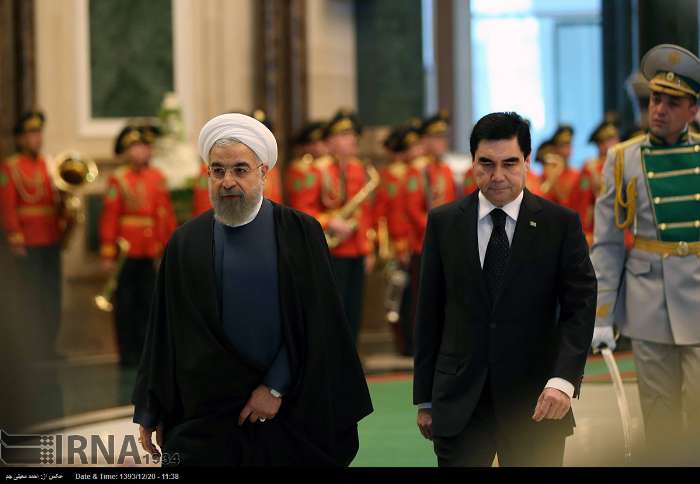 Iranian President Hassan Rouhani meets Turkmen counterpart Gurbanguly Berdimuhamedow in Ashgabat on March 11, 2015.[/caption]
Iranian President Hassan Rouhani meets Turkmen counterpart Gurbanguly Berdimuhamedow in Ashgabat on March 11, 2015.[/caption]Iranian President Hassan Rouhani said Wednesday his country would increase its imports of gas from Turkmenistan, during a visit to the reclusive Central Asian state in which he signed a slew of bilateral agreements.
Rouhani said energy cooperation with post-Soviet Turkmenistan in oil and gas had "big potential" after talks with his Turkmen counterpart Gurbanguly Berdymukhamedov.
"We agreed to increase supplies of Turkmen gas to Iran," Rouhani.
He did not specify what the increase would be, but Iran already imports roughly 10 billion cubic metres (bcm) of gas per year from Turkmenistan, making it the second biggest purchaser of the country's gas and its third largest trade partner after China and Turkey.
The two countries signed 18 agreements during the visit and Iran also thanked Turkmenistan for its support of Iran's "peaceful nuclear programme."
Referring to Rouhani as a "brother", Berdymukhamedov said that trade between the two countries reached $3.7 billion (3.4 billion euro) last year, up 25 percent from 2013. Rouhani responded that he hoped the figure would reach $60 billion in the next ten years.
Rouhani also said that Iran was prepared to offer its services as a transit country for "transport of Turkmen gas, oil and electricity to third countries."
Officials at the National Iranian Gas Company have recently been promoting Iran as part of a corridor to take gas from Azerbaijan and Turkmenistan to Europe via Turkey, but Iran remains under sanctions imposed by Brussels and Washington.
EU officials currently favour the Trans-Caspian Gas Pipeline, which would bring gas from both post-Soviet countries to the EU while bypassing Iran and Russia, with whom relations are strained over the Ukraine conflict.
Turkmenistan shares a border of over 1,000 kilometres (621 miles) with Iran as well as a railway link completed at the end of last year that connects the two countries and Kazakhstan.
Turkmenistan is currently heavily dependent on China, which is importing over 35 bcm of Turkmen gas annually according to China National Petroleum Company, a figure that may grow to 65 bcm by 2020.
Russian energy giant Gazprom announced a drawdown of gas imports from the Central Asian states from 10 bcm to 4 bcm, earlier this year, prompting a state-owned think tank to brand the company an "unstable partner" in February.
Low prices for hydrocarbons, which are 90 percent of Turkmen exports, caused Turkmenistan to devalue its manat currency by 19 percent at the beginning of the year.
By AFP










